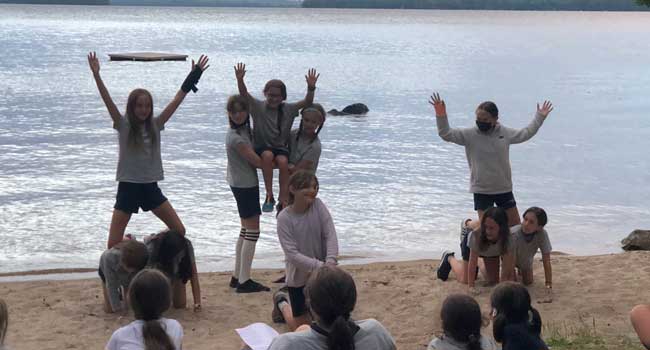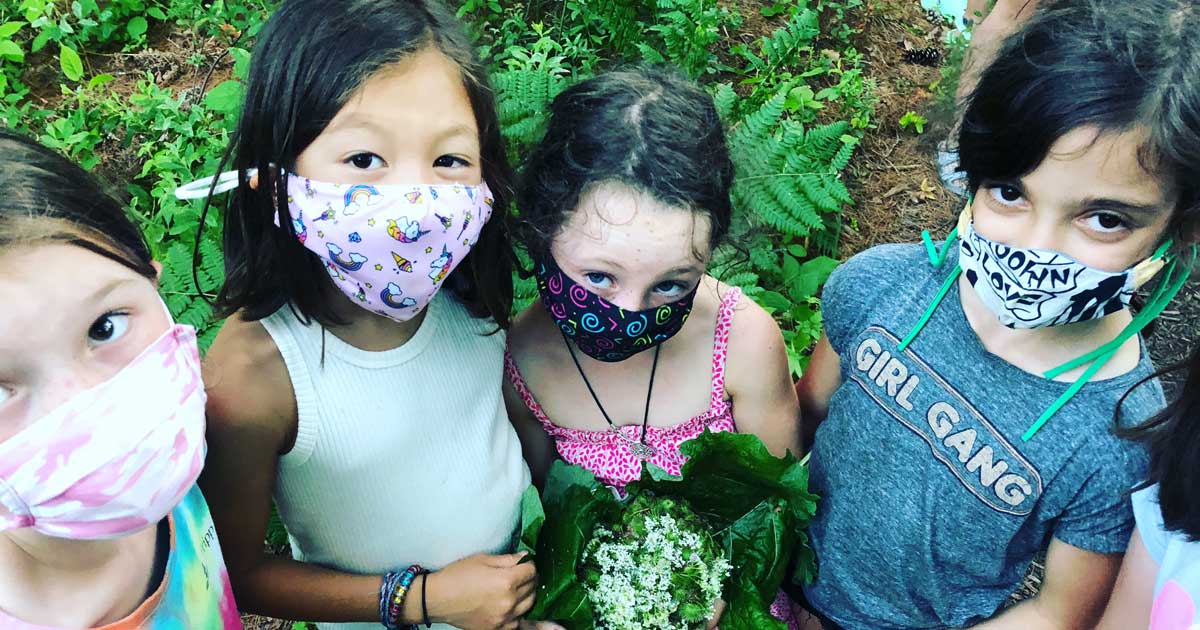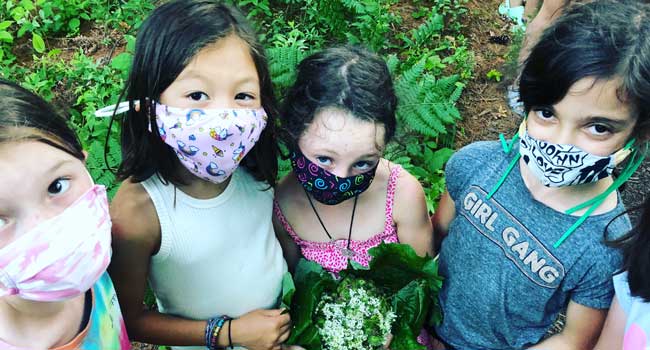Pam Cobb has been the director and owner of Camp Runoia for 34 summers. Situated on a sandy-bottomed lake in Maine, Runoia is an all-girls camp that teaches girls resilience and independence. Cobb and her team have always modeled these traits, but in 2020 they showed the Runoia spirit of determination and grit in ways they never imagined. They plan to do the same for summer camp in 2021 with COVID-19 precautions.
While many camps made the heartbreaking and difficult decision to suspend camp in 2020, Cobb successfully ran camp for 80 girls. Like other camp directors who did the same, Cobb leaned heavily on her leadership team, doctors and other experts, and followed state mandates. She was also part of a group of 16 other Maine camps that were able to solicit advice and best practices from each other.
Cobb and her team faced innumerable and often overwhelming challenges, and she acknowledges that there is still so much uncertainty leading into the summer of 2021. As she herself plans for any number of scenarios for summer camp in 2021 with COVID-19 precautions, she hopes that her peers can learn from what worked for her at Camp Runoia in 2020.
Keep the Camp Spirit and Make Significant Adjustments

For Cobb and her team, there was no question that camp was going to be very different in 2020. Instead of approaching summer with the goal of keeping as many things the same as possible, she leaned into these differences. She made some difficult decisions, but they ultimately helped her succeed. Specifically, she:
- Adjusted the typical way that campers were organized
- Changed how activities were run
- Limited off-campus activities and on-site visitors, and
- Created plans for various levels of Coronavirus outbreaks among staff and campers
A New Name
One of the more innovative decisions suggested by Cobb’s co-director, Alex Jackson, was to give camp a different name in 2020. Jackson recognized that Runoia was going to be completely unique, and wanted to differentiate and acknowledge the forthcoming experiences of campers. Jackson chose the name ‘Camp Runoia Harmonyville.’
The team also changed the terminology used to organize campers. They set up a pod-like system based on what they called Households and Neighborhoods. Each cabin was a Household, and a series of Households made up a Neighborhood.
Initially, campers were limited to interactions with only their Household. After two weeks at camp, and negative test results, these interactions were expanded to Neighborhoods. They plan to use a similar approach for summer camp in 2021 with COVID-19 precautions.
Adjusted Schedules
Cobb’s goal for camp was to create as much space as possible between campers, and to institute new cleanliness procedures. She purchased and assembled outdoor hand washing stations and rented a tent to create an outdoor eating space. Runoia is a small camp, typically serving 220 campers, and in 2020 there were 80 campers in attendance. Still, Cobb believes that larger camps can use these same approaches and successfully run camp by spreading campers out on their sites.
At Runoia, campers typically choose which activities they want to participate in, and campers of various ages participate together. This past summer, activities were instead limited to Households, so campers were only in close proximity to their bunk mates. Masks were worn when campers moved between activities, and were also worn if the specific activity leader was from a different Household.
While each camp director will need to determine their own language and process depending on the specific activities their camp offers, Cobb’s approach proves that activities don’t need to completely change to comply with COVID-19 precautions.
A Safe Bubble
In order to run camp in a bubble, Cobb instituted a policy that prohibited anyone from leaving camp. Staff members were able to get reprieves from running activities by going for runs, taking bike rides, or going out on the lake, but they weren’t allowed typical off-site activities such as going to local stores or restaurants. Cobb’s team collaborated with local grocery stores where staff members could place orders, and she allowed them to order takeout. The only people permitted to come into camp were those making food deliveries for the camp kitchen.
The bubble also meant that parents weren’t allowed on-site to drop off their children on the first day of camp, and that there was no visiting day. Cobb says that typically parents are not allowed to speak with their kids on the phone, but this rule was relaxed in 2020 for situations in which parents felt like they needed this type of communication.
Outbreak Plans
Another change made to Runoia’s physical space was the creation of an isolation unit. This space was set aside specifically for any staff members who might test positive for COVID-19. The Runoia team distributed masks, hand sanitizer, and gloves to all staff members to facilitate safe travel to camp and tested everyone upon arrival. Even with these precautions, one member of Runoia’s staff did test positive when a second test was administered four days after arrival.
Planning ahead for such a circumstance meant Cobb was prepared. This staff member was immediately isolated and remained so for 14 days. Contact tracing was done, and all the other counselors who had come into contact with her were isolated as a group and tested multiple times.
Cobb communicated about the situation to all parents, giving them the opportunity to unenroll their children if they were uncomfortable. In the end, while a handful of families did make this decision, the majority of families trusted the approach and not a single other camper or staff member tested positive all summer.
One specific outbreak decision that Cobb and her team made before camp started was that if a camper tested positive they would need to be picked up from camp immediately. Cobb explains that a 14-day separation for a camper felt unsafe emotionally, and she didn’t want to risk them being ostracized. No matter how the vaccine is administered, this rule will not change during summer camp in 2021 with COVID-19 precautions.
For Cobb and her team, there was no question that camp was going to be very different in 2020. Instead of approaching summer with the goal of keeping as many things the same as possible, she leaned into these differences. She made some difficult decisions, but they ultimately helped her succeed.
The Ups and Downs for Summer Camp Staff
Cobb says that the biggest challenge came in the early days of the pandemic, when there was so much uncertainty about summer. Once she decided to move forward with camp, and had a pool of registered campers, new challenges awaited.
One example was that a number of Runoia’s staff members chose not to work at camp, including their chef, site manager, and office manager. Accounting for this was no easy task, but Cobb says that everyone pitched in to help. Other team members helped with office tasks, made meals, washed dishes, took out the trash, and mowed the lawn.
One surprise related to staff was actually something that Cobb heard after summer had ended. A number of her counselors are teachers and some of them reached out to her and said that working over the summer, and dealing with so many changes and challenges, gave them confidence that they had the skills they needed to approach the school year.
Worth the Extra Effort as we Look Ahead to Summer Camp in 2021 with COVID-19 Precautions
Cobb is clear that the experience of planning for a variety of scenarios, and then running camp with so many adjustments, was physically and emotionally exhausting. That doesn’t make her second guess the decision one bit.
She says that every day campers thanked her and told her that camp was the best thing that had happened to them in months. She said it brought them so much joy to collaborate with each other, dress up, and be silly. This positivity continued after camp—Cobb has received many messages from parents about what a difference being at camp made in their kids’ lives and how they will remember it forever.
This feedback is encouraging as Cobb plans for 2021. She is preparing for a regular camp schedule this coming season, albeit with a lower camper density. She is adding extra time between two sessions for cleaning, and will maintain the same focus on outdoor activities and smaller camper groups.
Different but the Same
Summer 2020 was Camp Runoia’s 114th season. In many ways it was completely different, but in others it was the same as it’s always been. Cobb’s goal is to lead a camp that creates opportunities for girls to become independent and build confidence while having fun and meeting people from all over the world.
Cobb says that the ‘Runoia way’ is to teach girls that they can do anything, so it’s only fitting that she learned that lesson herself this past summer.

